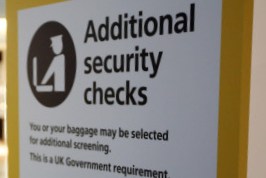Schedule 7 terror laws used to interrogate activists
Netpol | 30.12.2012 10:32 | Other Press | Policing | Repression
There is now abundant evidence that the police are using terrorism powers to stop and question activists on their political activities when they pass through UK ports. It is undoubtedly very helpful to the police that the draconian powers introduced by Schedule 7 of the Terrorism Act 2000 provide no right to silence – a refusal to answer questions can lead to a criminal conviction. The powers are also hugely intimidating – people can be detained for up to nine hours and have their DNA and fingerprints taken. To top it all, no ‘reasonable suspicion’ is needed – the police and border authorities can stop whoever they wish. What more could ‘total policing’ wish for?

Back in August, the anarchist federation published an account of the way in which two of its members were interrogated under Schedule 7. They were returning from an international anarchist gathering in Switzerland. Information from phones and cameras was retained, as well as their DNA and fingerprints. They were questioned about their involvement in the gathering and their views on anarchism.
This sort of incident is not unusual. Netpol has spoken to other activists who have had similar treatment when leaving or returning to the UK. One peace campaigner was twice stopped and questioned on his involvement anti-NATO and anti-nuclear campaigns. Another activist was questioned on his role with an anti-arms trade campaign, and his work for a respected research organisation, yet another on his involvement with a prominent environmental campaign. In one case counter-terrorism officers demanded that the person they had detained listed all the protest activity he was engaged in.
The nature of the questions that were asked indicates that in most, if not all of these cases, the officers carrying out the interrogation had clearly done their research before the questioning took place. The identity of the people concerned was already known, along with at least some information relating to their background. These stops were not random or triggered by a travel pattern. They were carried out on the basis of pre-existing intelligence relating to political activity.
The nature of the questions that were asked indicates that in most, if not all of these cases, the officers carrying out the interrogation had clearly done their research before the questioning took place. The identity of the people concerned was already known, along with at least some information relating to their background. These stops were not random or triggered by a travel pattern. They were carried out on the basis of pre-existing intelligence relating to political activity.
This is not only deeply disturbing, but potentially unlawful. Schedule 7 provides wide powers, but does restrict the purpose of the stop to the prevention of terrorism. Paragraph 9 states that;
“the powers…should not be used should not be used for any other purpose [other than in connection to terrorism]”
And in the Notes for Guidance on paragraphs 9 and 10;
“an examination must cease and the examinee must be informed that it has ended once it has been ascertained that the person examined does not appear to be or to have been concerned in the commission, preparation or instigation of acts of terrorism,”
No matter how much the authorities try to stretch the definition of terrorism, it is clear that political activity is NOT the same thing as the ‘commission, preparation or instigation of acts of terrorism’. But political activists are not the only group to be subjected to this type of harassment at border controls. Organisations like Stopwatch, Cageprisoners and CAMPACC have done a great deal of work to demonstrate how Schedule 7 is used to harass people of Muslim appearance and from migrant communities.
The Home Office has recently consulted on changes to Schedule 7. In its submission to this consultation, Netpol has challenged the Home Office to outlaw the use of Schedule 7 to gather information or intelligence about political activism, and we await their response.
We do not accept, however, that Schedule 7 powers can be made acceptable by giving the legislation a few tweaks around the edges. This power is discriminatory and draconian, it undermines civil rights and criminalises communities and political dissent. Like so many other counter-terrorism powers put in place by the last Labour government, it is something that we would all be better off without.
Netpol
 Homepage:
http://netpol.org/2012/12/12/schedule-7-terror-laws-used-to-interrogate-activists/
Homepage:
http://netpol.org/2012/12/12/schedule-7-terror-laws-used-to-interrogate-activists/
Comments
Display the following 2 comments